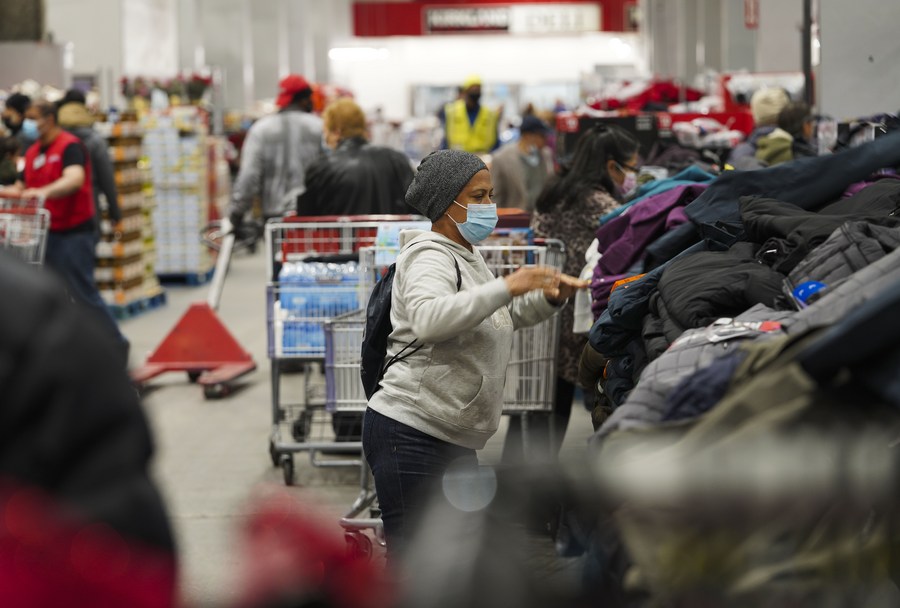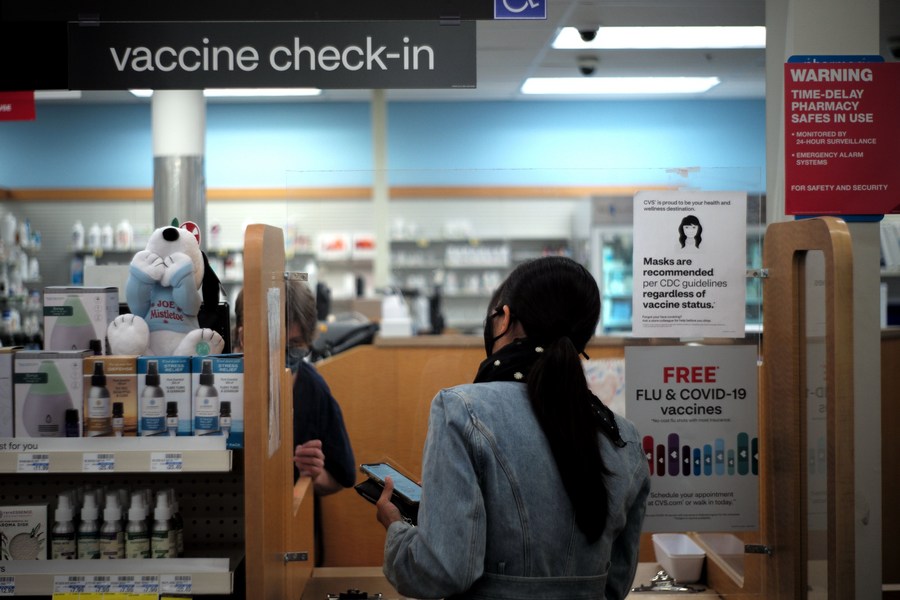Tougher testing rules take effect for U.S. entry as Omicron poses new challenges
File video: Have a look of the main streets of San Francisco and New York, one day after the first U.S. case of Omicron was reported in this Californian city at the beginning of December, and watch the evaluation its Governor Gavin Newsom made then about the state's pandemic situation. (Xinhua)
CDC Director Rochelle Walensky says that more and more probable Omicron cases are heard about every day in the United States, but the earlier-discovered Delta variant is still the dominant strain in the United States -- almost all coronavirus cases are associated with it.
NEW YORK, Dec. 6 (Xinhua) -- As the Omicron variant was found in more U.S. states, tighter rules for entry into the country for international travelers went into effect on Monday -- all incoming travelers will need to show proof of a negative test taken within a day of their departure, regardless of vaccination status. The time span for all international air travelers to take a pre-departure coronavirus test is shortened from three days to one, in order to "provide less opportunity to develop an infection with the Omicron variant prior to arrival in the United States," said an order from the Centers for Disease Control and Prevention (CDC).
U.S. airlines have been asked to collect contact-tracing information for inbound international travelers and send it to the CDC "upon request" since Nov. 8, when the country adopted a new set of international travel restrictions. The information collected includes names, addresses, phone numbers, emails and dates of birth.
Meanwhile, the Omicron variant of the coronavirus has been identified in at least 17 U.S. states since California reported the country's first case on Dec. 1, and health officials warned cases are likely to increase as scientists rush to answer whether it is more transmissible or better able to evade the protections of existing vaccines.
On Sunday, CDC Director Rochelle Walensky said more and more probable Omicron cases were heard about every day in the United States, but the earlier-discovered Delta variant was still the dominant strain in the United States -- almost all coronavirus cases were associated with it.
Also on Sunday, Anthony Fauci, the nation's top public health adviser, said that early reports about Omicron cases being relatively mild were "encouraging." "Though it's too early to really make any definitive statements about it, thus far, it does not look like there's a great degree of severity to it," he noted.

People shop at a COSTCO store in New York, the United States, Dec. 2, 2021. (Xinhua/Wang Ying)
CITY MANDATE, HOSPITAL STRAIN
On Monday, Mayor Bill de Blasio announced that New York City has taken a "bold" step to impose a vaccine mandate for all private sector employers as a preemptive measure to fight a surge of COVID-19 cases this winter. "We've got Omicron as a new factor, we've got the colder weather ... we've got holiday gatherings," he told MSNBC.
The mandate covers 184,000 businesses and will go into effect on Dec. 27. Everyone 12 and older, workers and customers, will be required to show proof of two vaccine doses by that date, unless they received Johnson &Johnson's single-dose vaccine. The purpose is to avoid the shutdowns in March 2020 when COVID-19 ruined NYC and its economy.
The city will also require proof of vaccination for children ages 5 to 11 for indoor dining, entertainment and fitness establishments. Kids will be required to have proof of at least one does by Dec. 14. They will also have to show proof of one dose for high-risk extracurricular activities such as sports and dance by the same date.
On Sunday, U.S. business magazine Forbes reported that nearly all U.S. states have at least 70 percent of their hospital and intensive care unit (ICU) beds occupied and could face hospital constraints if coronavirus cases continue to surge amid the spread of the Delta variant and new Omicron variant.
There are 611,917 (78.7 percent) hospital beds and 65,226 (79.3 percent) ICU beds occupied in the United States, with COVID-19 patients occupying 59,579 (7.75 percent) of hospital beds and 13,736 (17.53 percent) of ICU beds, the report said, quoting data from the Department of Health and Human Services.
Rhode Island has the lowest statewide hospital capacity now in the nation with 87.97 percent of its hospital beds in use, while Massachusetts, which last week recorded its highest count of COVID-19 cases since January, is right behind with 87.63 percent of its hospital beds in use with multiple hospitals reporting their ICUs full.

A woman waits for injection of COVID-19 booster vaccine in Burlingame, California, the United States, Dec. 4, 2021. (Xinhua/Wu Xiaoling)
VACCINES, PILLS
A new study found that the Johnson &Johnson COVID-19 vaccine serves as an effective booster on top of full vaccination from the Pfizer vaccine. A J&J booster, administered six months after two doses of the Pfizer vaccine, increased antibody and T-cell responses, demonstrating potential benefits of mix-and-match boosters.
"There is early evidence to suggest that a mix-and-match boosting approach may provide individuals with different immune responses against COVID-19 than a homologous boosting approach," said Dan Barouch, director of the Center for Virology and Vaccine Research at the Beth Israel Deaconess Medical Center in Boston, which released the study on Sunday.
On Monday, The Wall Street Journal quoted public health experts as saying that promising COVID-19 treatment pills are likely to take longer to reach patients in low- and middle-income countries than in rich ones because of manufacturing and pricing obstacles, despite efforts by drugmakers to make them more available.
"The medicines are set to play a central role in the world's fight against COVID-19 and could become even more important if, as some scientists fear, vaccines turn out to be less effective against the new Omicron variant. Researchers say the pills are likely to be less affected by Omicron's mutations," said the report.
Yet drug-access advocates and public health experts expressed concern that the pills will arrive months later in poor countries and delay treating people, similar to the way the world's vaccination campaign has left many in poor countries unvaccinated after wealthy governments bought much of the early supply, it added.
Photos
Related Stories
- Scholar criticizes US 'democracy summit'
- Virtual democracy summit about international trade: Bill Brown
- America no longer "shining city on a hill"
- Washington's mixed messages on Taiwan threat to cross-Strait stability
- Chinese ambassador to U.S. calls for implementation of spirit of meeting between presidents
Copyright © 2021 People's Daily Online. All Rights Reserved.










